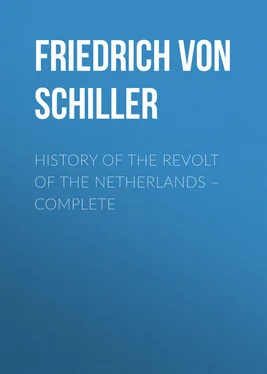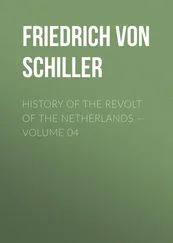Friedrich Schiller - History of the Revolt of the Netherlands – Complete
Здесь есть возможность читать онлайн «Friedrich Schiller - History of the Revolt of the Netherlands – Complete» — ознакомительный отрывок электронной книги совершенно бесплатно, а после прочтения отрывка купить полную версию. В некоторых случаях можно слушать аудио, скачать через торрент в формате fb2 и присутствует краткое содержание. Жанр: История, literature_18, foreign_antique, foreign_prose, на английском языке. Описание произведения, (предисловие) а так же отзывы посетителей доступны на портале библиотеки ЛибКат.
- Название:History of the Revolt of the Netherlands – Complete
- Автор:
- Жанр:
- Год:неизвестен
- ISBN:нет данных
- Рейтинг книги:3 / 5. Голосов: 1
-
Избранное:Добавить в избранное
- Отзывы:
-
Ваша оценка:
- 60
- 1
- 2
- 3
- 4
- 5
History of the Revolt of the Netherlands – Complete: краткое содержание, описание и аннотация
Предлагаем к чтению аннотацию, описание, краткое содержание или предисловие (зависит от того, что написал сам автор книги «History of the Revolt of the Netherlands – Complete»). Если вы не нашли необходимую информацию о книге — напишите в комментариях, мы постараемся отыскать её.
History of the Revolt of the Netherlands – Complete — читать онлайн ознакомительный отрывок
Ниже представлен текст книги, разбитый по страницам. Система сохранения места последней прочитанной страницы, позволяет с удобством читать онлайн бесплатно книгу «History of the Revolt of the Netherlands – Complete», без необходимости каждый раз заново искать на чём Вы остановились. Поставьте закладку, и сможете в любой момент перейти на страницу, на которой закончили чтение.
Интервал:
Закладка:
Bruges, in Flanders, was, in the fourteenth and fifteenth centuries, the central point of the whole commerce of Europe, and the great market of all nations. In the year 1468 a hundred and fifty merchant vessels were counted entering the harbor of Sluys it one time. Besides the rich factories of the Hanseatic League, there were here fifteen trading companies, with their countinghouses, and many factories and merchants’ families from every European country. Here was established the market of all northern products for the south, and of all southern and Levantine products for the north. These passed through the Sound, and up the Rhine, in Hanseatic vessels to Upper Germany, or were transported by landcarriage to Brunswick and Luneburg.
As in the common course of human affairs, so here also a licentious luxury followed prosperity. The seductive example of Philip the Good could not but accelerate its approach. The court of the Burgundian dukes was the most voluptuous and magnificent in Europe, Italy itself not excepted. The costly dress of the higher classes, which afterwards served as patterns to the Spaniards, and eventually, with other Burgundian customs, passed over to the court of Austria, soon descended to the lower orders, and the meanest citizen nursed his person in velvet and silk.
[Philip the Good was too profuse a prince to amass treasures; nevertheless Charles the Bold found accumulated among his effects, a greater store of table services, jewels, carpets, and linen than three rich princedoms of that time together possessed, and over and above all a treasure of three hundred thousand dollars in ready money. The riches of this prince, and of the Burgundian people, lay exposed on the battle-fields of Granson, Murten and Nancy. Here a Swiss soldier drew from the finger of Charles the Bold, that celebrated diamond which was long esteemed the largest in Europe, which even now sparkles in the crown of France as the second in size, but which the unwitting finder sold for a florin. The Swiss exchanged the silver they found for tin, and the gold for copper, and tore into pieces the costly tents of cloth of gold. The value of the spoil of silver, gold, and jewels which was taken has been estimated at three millions. Charles and his army had advanced to the combat, not like foes who purpose battle, but like conquerors who adorn themselves after victory.]
Comines, an author who travelled through the Netherlands about the middle of the fifteenth century, tells us that pride had already attended their prosperity. The pomp and vanity of dress was carried by both sexes to extravagance. The luxury of the table had never reached so great a height among any other people. The immoral assemblage of both sexes at bathing-places, and such other places of reunion for pleasure and enjoyment, had banished all shame – and we are not here speaking of the usual luxuriousness of the higher ranks; the females of the common class abandoned themselves to such extravagances without limit or measure.
But how much more cheering to the philanthropist is this extravagance than the miserable frugality of want, and the barbarous virtues of ignorance, which at that time oppressed nearly the whole of Europe! The Burgundian era shines pleasingly forth from those dark ages, like a lovely spring day amid the showers of February. But this flourishing condition tempted the Flemish towns at last to their ruin; Ghent and Bruges, giddy with liberty and success, declared war against Philip the Good, the ruler of eleven provinces, which ended as unfortunately as it was presumptuously commenced. Ghent alone lost many thousand men in an engagement near Havre, and was compelled to appease the wrath of the victor by a contribution of four hundred thousand gold florins. All the municipal functionaries, and two thousand of the principal citizens, went, stripped to their shirts, barefooted, and with heads uncovered, a mile out of the town to meet the duke, and on their knees supplicated for pardon. On this occasion they were deprived of several valuable privileges, all irreparable loss for their future commerce. In the year 1482 they engaged in a war, with no better success, against Maximilian of Austria, with a view to, deprive him of the guardianship of his son, which, in contravention of his charter, he had unjustly assumed. In 1487 the town of Bruges placed the archduke himself in confinement, and put some of his most eminent ministers to death. To avenge his son the Emperor Frederic III. entered their territory with an army, and, blockading for ten years the harbor of Sluys, put a stop to their entire trade. On this occasion Amsterdam and Antwerp, whose jealousy had long been roused by the flourishing condition of the Flemish towns, lent him the most important assistance. The Italians began to bring their own silk-stuffs to Antwerp for sale, and the Flemish cloth-workers likewise, who had settled in England, sent their goods thither; and thus the town of Bruges lost two important branches of trade. The Hanseatic League had long been offended at their overweening pride; and it now left them and removed its factory to Antwerp. In the year 1516 all the foreign merchants left the town except only a few Spaniards; but its prosperity faded as slowly as it had bloomed.
Antwerp received, in the sixteenth century, the trade which the luxuriousness of the Flemish towns had banished; and under the government of Charles V. Antwerp was the most stirring and splendid city in the Christian world. A stream like the Scheldt, whose broad mouth, in the immediate vicinity, shared with the North Sea the ebb and flow of the tide, and could carry vessels of the largest tonnage under the walls of Antwerp, made it the natural resort for all vessels which visited that coast. Its free fairs attracted men of business from all countries.
[Two such fairs lasted forty days, and all the goods sold there were duty free.]
The industry of the nation had, in the beginning of this century, reached its greatest height. The culture of grain, flax, the breeding of cattle, the chase, and fisheries, enriched the peasant; arts, manufactures, and trade gave wealth to the burghers. Flemish and Brabantine manufactures were long to be seen in Arabia, Persia, and India. Their ships covered the ocean, and in the Black Sea contended with the Genoese for supremacy. It was the distinctive characteristic of the seaman of the Netherlands that he made sail at all seasons of the year, and never laid up for the winter.
When the new route by the Cape of Good Hope was discovered, and the East India trade of Portugal undermined that of the Levant, the Netherlands did not feel the blow which was inflicted on the Italian republics. The Portuguese established their mart in Brabant, and the spices of Calicut were displayed for sale in the markets of Antwerp. Hither poured the West Indian merchandise, with which the indolent pride of Spain repaid the industry of the Netherlands. The East Indian market attracted the most celebrated commercial houses from Florence, Lucca, and Genoa; and the Fuggers and Welsers from Augsburg. Here the Hanse towns brought the wares of the north, and here the English company had a factory. Here art and nature seemed to expose to view all their riches; it was a splendid exhibition of the works of the Creator and of the creature.
Their renown soon diffused itself through the world. Even a company of Turkish merchants, towards the end of this century, solicited permission to settle here, and to supply the products of the East by way of Greece. With the trade in goods they held also the exchange of money. Their bills passed current in the farthest parts of the globe. Antwerp, it is asserted, then transacted more extensive and more important business in a single month than Venice, at its most flourishing period, in two whole years.
In the year 1491 the Hanseatic League held its solemn meetings in this town, which had formerly assembled in Lubeck alone. In 1531 the exchange was erected, at that time the most splendid in all Europe, and which fulfilled its proud inscription. The town now reckoned one hundred thousand inhabitants. The tide of human beings, which incessantly poured into it, exceeds all belief. Between two hundred and two hundred and fifty ships were often seen loading at one time in its harbor; no day passed on which the boats entering inwards and outwards did not amount to more than five hundred; on market days the number amounted to eight or nine hundred. Daily more than two hundred carriages drove through its gates; above two thousand loaded wagons arrived every week from Germany, France, and Lorraine, without reckoning the farmers’ carts and corn-vans, which were seldom less than ten thousand in number. Thirty thousand hands were employed by the English company alone. The market dues, tolls, and excise brought millions to the government annually. We can form some idea of the resources of the nation from the fact that the extraordinary taxes which they were obliged to pay to Charles V. towards his numerous wars were computed at forty millions of gold ducats.
Читать дальшеИнтервал:
Закладка:
Похожие книги на «History of the Revolt of the Netherlands – Complete»
Представляем Вашему вниманию похожие книги на «History of the Revolt of the Netherlands – Complete» списком для выбора. Мы отобрали схожую по названию и смыслу литературу в надежде предоставить читателям больше вариантов отыскать новые, интересные, ещё непрочитанные произведения.
Обсуждение, отзывы о книге «History of the Revolt of the Netherlands – Complete» и просто собственные мнения читателей. Оставьте ваши комментарии, напишите, что Вы думаете о произведении, его смысле или главных героях. Укажите что конкретно понравилось, а что нет, и почему Вы так считаете.












